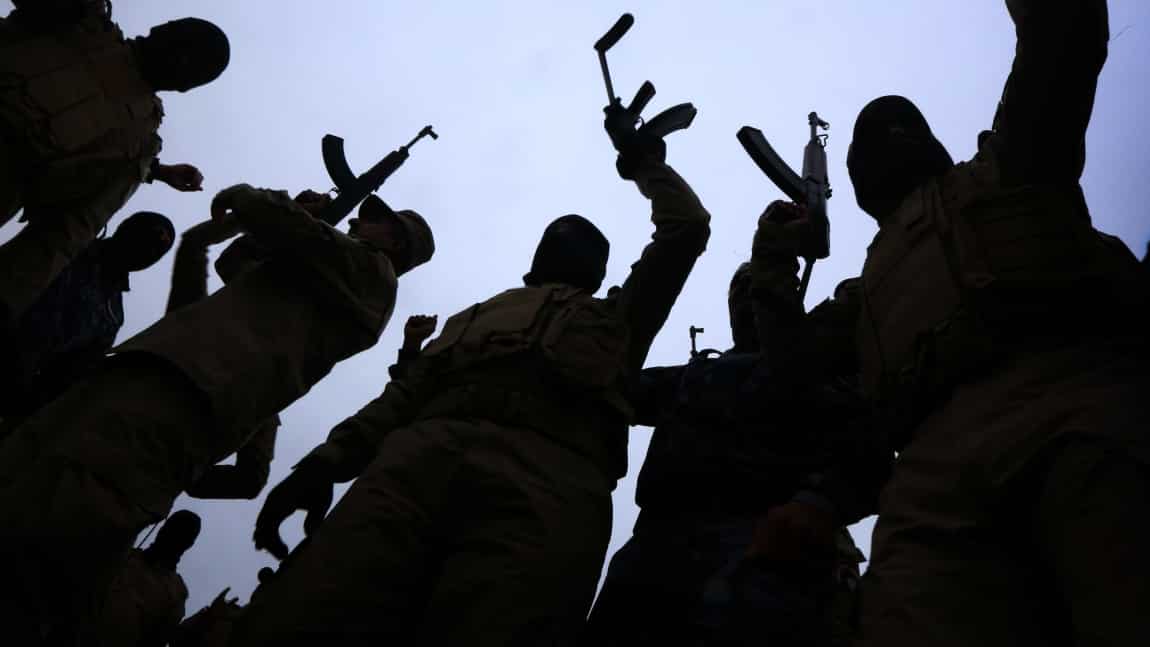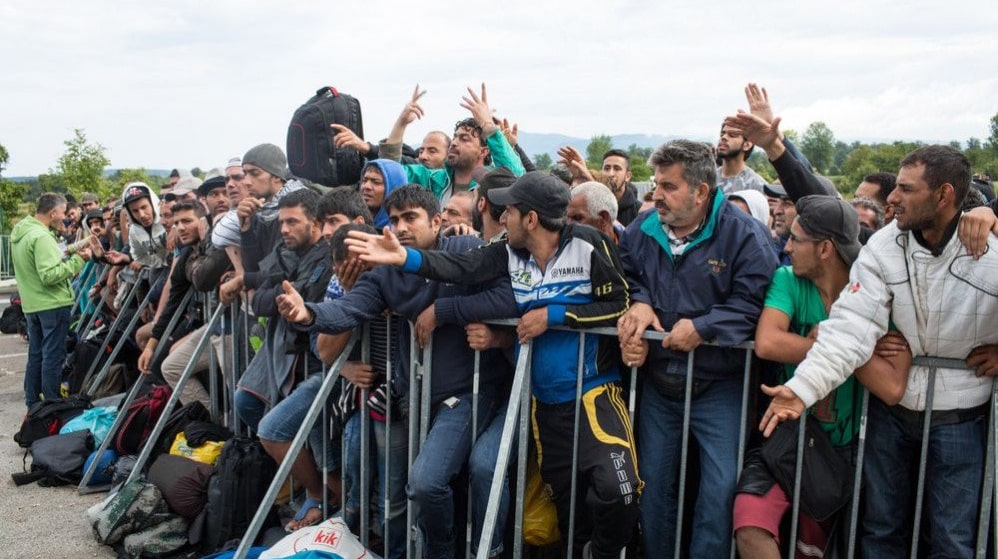The British public experienced shock in late June when they learned that three young men who were members of one of the United Kingdom’s oldest mosques, the al-Manar center in Cardiff, had joined the Syrian terrorist group Islamic State in Iraq and Syria (ISIS). As one member of the mosque explained to a reporter from The Guardian (June 27), “Those boys have been very naïve…. They have been radicalized. I don’t believe it happened here.”
Actually, the fact that three young Britons had become radicalized should not be a surprise. While most Muslims in Britain are moderates, sizeable numbers of young British Muslims have enlisted in the jihadist movement in Syria, which has now spread to Iraq and Jordan. The United Kingdom’s tolerance of jihadist clerics under a policy of multicultural toleration should be a lesson to the West, especially in the United States. Homeland Security estimates that at least seventy young Muslim Americans, influenced by websites and radical clerics, have also joined Syrian extremists. They are being used by radical websites and Twitter accounts for propaganda purposes to enlist other Western Muslim youth. The greater threat is that they are being trained as terrorists to return to their home countries to wage war. Federal officials have placed security at airports on high alert.
The lesson to be learned is the failure of multiculturalism in the West. The inability of the United Kingdom and the United States to integrate some Muslim immigrants into the broader society and the resistance to inculcating Western values sow the seeds of terrorism in our own countries. Our schools, universities, media and political elites too often spout multiculturalism, a vague concept of tolerance for ideas antithetical to Western values, whether concerning the treatment of women, economic opportunity, the rule of law, the separation of church and state, or religious toleration. Instead, new immigrants learn that the West is sexist, racist and oppressive; its seeming prosperity is built on the subjugation of poorer nations throughout the world; and its values boil down to overconsumption, gross materialism and hedonism.
As used by today’s proponents, multiculturalism becomes a ram to knock down core Western values. The teaching of Western history, literature, politics and civics has been superseded by an incoherent narrative of class, gender and racial oppression. Learning about George Washington and the founding of the Republic is replaced by learning that our founding fathers included white slaveholders. Shakespeare and writers such as Mark Twain are replaced with obscure women writers or Third World authors; religious leaders such as William Bradford, Roger Williams and St. Elizabeth Ann Seton are ignored in favor of Malcolm X. Plato, Aristotle and St. Thomas Aquinas are not assigned lest they crowd out French postmodern cultural theory or gender epistemology.
This erosion of core Western values in the classroom, the media and popular culture is not new. What is new is that homegrown terrorists are now in our midst. This is no longer a war of words, but a real war.
The British experience is especially revealing in this regard.
Terrorists from Wales
The three British Muslim youths, two brothers and a friend, who joined ISIS in Syria, were first radicalized in Cardiff, Wales. Nasser and Assel Muthana, 20 and 17, and their friend Reyaad Khan, 20, became committed jihadists while attending the al-Manar mosque close to the Cathays Park offices of the Welsh government. Once in Syria, Nasser and Khan appeared in a recruitment video for the terrorist group ISIS. A third man, identified only as Raqib, appeared in the video as well. The BBC reported that he was educated in Aberdeen, Scotland after moving from Bangladesh at an early age.
Members of the al-Manar Center claimed to be surprised that these brothers had become declared terrorists. The brothers came from a comfortable background and were educated in the United Kingdom. The al-Manar Center is not seen as a hotbed of radical jihadism. The Guardian reports, however, that privately some Muslim leaders in Cardiff criticize the al-Manar Center as having given a platform for extremist views. When Saudi cleric Mohammed al-Arifi spoke at the center in 2012, he called for the overthrow of the Bashar al-Assad regime in Syria. Al-Arifi is well known for his extremist views and has since been banned from the UK by the Home Office. A Home Office spokesman told The Guardian that “The government makes no apologies for refusing people access to the UK if we believe they represent a threat to our society. Coming here is a privilege that we refuse to extend to those who seek to subvert our shared values.”
While Al-Arifi has been banned from speaking in the UK, other extremist Muslim clerics appear to have free voice. Indeed, Al-Arifi was not the only jihadist to appear at the Cardiff Muslim center. Haithan al-Hadad, a preacher in London and a member of the Islamic Sharia Council, recently visited al-Manar. Two other brothers, Gurkanth Desai and Abdul Hiah, who were part of an al-Qaida-inspired terrorist cell that conspired to bomb the London Stock Exchange, also attended the center.
But radical Islamic propaganda in the UK extends beyond Cardiff. If the al-Manar Center were the only source of jihadism in Britain, we could perhaps see its harmful fallout as an isolated case. Extremist views— while not representing the majority of Muslims in Britain—are found in Muslim communities, mosques, and on the Internet throughout the UK. The father of the Muthana brothers believes that his sons were radicalized at “pop-up” meetings in Cardiff rather than by any one mosque or Internet video. He reported that extremists were leafleting Muslim communities in the city, encouraging young men to join the jihad in Syria and Iraq. Secretive recruitment meetings were held in cafes, restaurants, private homes or leisure centers, never in the same venue twice in order to avoid police infiltration.
Some Muslim clerics have tried to counter this campaign to recruit youthful jihadists. The imam in the South Wales Islamic Center in Butetown, a few miles from al-Manar, has given sermons aimed at dissuading young Muslims from going to Syria. Other Muslims in Wales have denounced the Muthana brothers, asserting that they are not representative of the community. “We’re part of this country,” Welsh taxi driver Ishmail Yossef told The Guardian (June 23, 2014). “We respect the law of the country. A few kids are bringing shame on us.”
Most Muslims in the United Kingdom are hard-working and law-abiding immigrants who came to Britain to find a better way of life for themselves and their families. A few Muslim leaders have denounced extremism, but their voices have been a minority. At the same time, the Home Office has banned and deported notorious radical preachers. The problem is not that jihadists represent a majority of the Muslim population in the UK, but that Muslim youth are not being effectively assimilated into the larger British culture. It is not clear to the majority of Britons, let alone the elite classes, exactly what British culture is these days. What does it stand for?
Radicalization in Syria and the UK
The estimated 200 British fighters in Syria who have joined a “holy war” of terrorism identify with radical Islam rather than British traditional values of God, King (or Queen) and Country. Shiraz Maher of the Center for the Study of Radicalism at King’s College London told the BBC that Syria has become a magnet for young Muslims across the world eager to take part in jihad. These British jihadists are in their 20s, mostly university-educated, and predominately of British-Pakistani origin. They have been recruited primarily through prayer rooms attached to mosques.
While a few of the British fighters in Syria say their fight is only against the Assad regime in Syria, Home Secretary Theresa May told the BBC in October 2013 that Syria has become a training ground for a new generation of British terrorists. Her concerns were echoed by the head of British intelligence, who says that thousands of Islamist extremists see Britain as a legitimate target for attacks. This concern was affirmed in the annual report to Parliament by the Intelligence and Security Committee, which warned that the involvement of UK residents in Syria will pose a significant threat for years to come.
These British jihadists found easy access to extremist propaganda in their home country. Reports of extremist literature in Britain’s 1,500 mosques, more than 200 Islamic centers and dozens of Muslim academies and schools, have been known for a long time. In 2007, Denis MacEoin, an Islamic studies expert at Newcastle, reported that his team of researchers uncovered malignant literature inside as many as a quarter of Britain’s mosques. This literature included leaflets, DVDs and journals denouncing Christians, Jews, homosexuals, and women who do not abide by strict Islam. This literature included statements that homosexuals should be burnt, stoned, or thrown from mountains or tall buildings and then stoned where they fell. Those who changed their religion, converted to Christianity or committed adultery should experience a similar fate. Almost half of the literature was written in English, suggesting it was aimed at young audiences. The material was openly available in many mosques, including the East London Mosque in Whitechapel, which had been visited earlier by Prince Charles.
This was hardly the first report of such literature being circulated. Only a few months before the report was issued, an undercover reporter for BBC Channel 4 filmed preachers and obtained DVDs and books inside mosques filled with invective against Christians and Jews and condemning democracy. These videos and books described women as congenitally intellectually deficient and encouraged beating women when they deviate from Islamic dress codes. The literature recommended that children over the age of 10 be beaten if they do not pray.
Much of this literature was funded from Saudi Arabia. After 9/11 the Saudi government scaled back its support of extremist literature, but it remains in wide circulation. At the time of the 2007 BBC report, one expert, Yahy Birt, estimated that Saudi spending on religious propaganda promoting its extremist version of Islam, Wahhabism, was $2 billion to $3 billion a year since 1975. Saudis have flooded the Islamic book market with cheap well-produced Wahhabi literature, aggressively targeting a global English-speaking audience. The effect has been the closing of smaller bookstores catering to a more mainstream Muslim market.
This Saudi campaign has backfired in that Saudi Arabia has lost control of the new global Wahhabism. Anti-Saudi Wahhabis, such as the infamous cleric Abu Hamza in Britain, have pronounced that the Saudi king has broken his divine covenant with God and therefore the duty of Muslims is to overthrow the Saudi regime. The focus of violent Islamic radicalism has shifted from Wahhabis in Saudi Arabia to anti-Saudi Wahhabis in Iraq and Syria.
Repulsed by a British youth culture of drugs, sex and rock ’n’ roll, young Muslims have turned to what they see as orthodox Islam and jihadism. Without clear British identities, they look to a fundamentalist version of Islam for a sense of ideological community. This was the case with the notorious British “shoe- bomber” Richard Reid. This brand of Islam rejects scholarly interpretation of the Koran in favor of a literal reading of holy texts without an understanding of the contexts in which different parts of the Islamic scriptures were framed.
How Extremism Has Taken Root
In June the British Office for Standards in Education investigated 21 state-supported Muslim-majority schools in the central English city of Birmingham.
The report concluded that the city has failed to protect students from Islamic extremism. Chief inspector Michael Wishaw stated there was clear evidence of an “organized campaign to target certain schools” by some members of the schools’ board of governors. The report charged that board members have tried—and sometimes succeeded— to promote a curriculum based on a “narrow faith- based ideology.” The report found that “staff and some head teachers variously described feeling ‘intimidated,’ ‘undermined,’ or ‘bullied’ by governors, and sometimes by senior staff into making changes they did not support.” Park View Educational Trust, which runs three of the criticized schools, rejected the inspectors’ report. A trust spokesman claimed the inspectors came looking for proof of a conspiracy and found one. Why the British government would come looking for a conspiracy in the first place was not explained.
What cannot be denied, however, is that Islamic extremism and violence have come to Britain. The jihad being waged is not found only in Syria or Iraq. The British government has tried to counter the spread of radical Islam, but it has to tread, as do all Western democracies, the fine line between religious freedom and the Islamist call for violence, and between free speech and inciting violence.
This tension between protecting civil liberties and protecting society from violence is evident in the case of the group Islam4UK led by Anjem Choudary, a radical cleric. In 2010 the Home Secretary banned the organization under the Terrorism Act. The organization called for the institution of sharia law in the United Kingdom. Islam4UK declared it was disbanding, but other organizations aligned with the movement sprang up using different names while carrying the same message.
In May 2013, Britain and the Western world were shocked by the savage murder of a British soldier, Lee Rigby, who was repeatedly stabbed and hacked in the neck by two British-born jihadists, Michael Adebolajo and Michael Adebowale. They singled out Rigby after scouring an area around the Woolwich barracks hunting for a soldier to kill. This was the first murderous attack in Britain by Islamic extremists since the July 7, 2005 bombings of London’s transport system by four suicide bombers. Adebolajo and Adebowale saw themselves as soldiers of Allah commanded to murder in retaliation for the deaths of Muslims in Iraq and Afghanistan.
After running Rigby down with a car and mutilating him so badly he had to be identified by dental records, they dragged his body into the road and encouraged people to take pictures with their mobile phone cameras. Adebolajo was recorded as declaring, “We swear by Allah we will never stop fighting you…. This British soldier is an eye for an eye, a tooth for a tooth.” Both Adebolajo and Adebowale came from Christian Nigerian families, but became radicalized after attending events led by Anjem Choudry from Islam4UK. Prior to the attack, Adebolajo led a number of extremist Islamic rallies in Britain. In 2010 he was arrested in Kenya, a gateway to terrorist areas in Somalia, but was released. At the trial of Adebolajo and Adebowale, it took the jury only 90 minutes to convict them.
The Emerging Backlash
Perhaps it was inevitable that a backlash against extremism has occurred in Britain. A group calling itself the English Defense League has emerged in Birmingham and London. This group demonstrated in Birmingham’s city center, chanting “Muslim bombers off our streets, Muslim bombers off our streets.” The group avows that it is not anti-Muslim, but anti-extremist-Muslims. One group member told the BBC, “There are town centers now that are plagued by Islamic extremists. There are women who don’t want to go shopping because there are 20 men in long Islamic dress shouting anti- British stuff and calling for a jihad and stirring up religious and racial hatred.” League demonstrations have led to confrontations with counter-demonstrators, anti-Nazi leftists and Muslims.
The recent victory sweep of the Euro-skeptic United Kingdom Independent Party in the European Union parliamentary elections signals a growing nationalist backlash in Britain. This same phenomenon is seen in the increasing popularity of anti-immigration parties in France and Germany. These parties remain independent from one another, but they indicate that more and more people in these countries have concluded that multiculturalism, promoted by the elites, has failed.
The Western tradition promotes the ideal of religious toleration and cultural pluralism. Western nations have not always lived up to these ideals. Nonetheless, these ideals emerged from a Christian tradition of respect for the dignity of the individual. This profound tradition should not be replaced by some vague concept of “multiculturalism,” which at its heart is anti-Western.
Only when Western policymakers and the public are confident in their own traditions and ideals will a war on terrorism be won.









You failed to mention the prison system in Britain as a source of radicalisation. The government is not doing enough to act on the problem of extremists influencing others in prison.
[…] Donor Empowers Digital Evangelizers – Ltl Flwr Strategies Goodbye, Mosul – Rorate Cæli British Jihadists: What The West Should Fear – William Borst PhD Seven Ways CNN Gets It Wrong on Bishop’s Residences – Jsh. Bowman […]